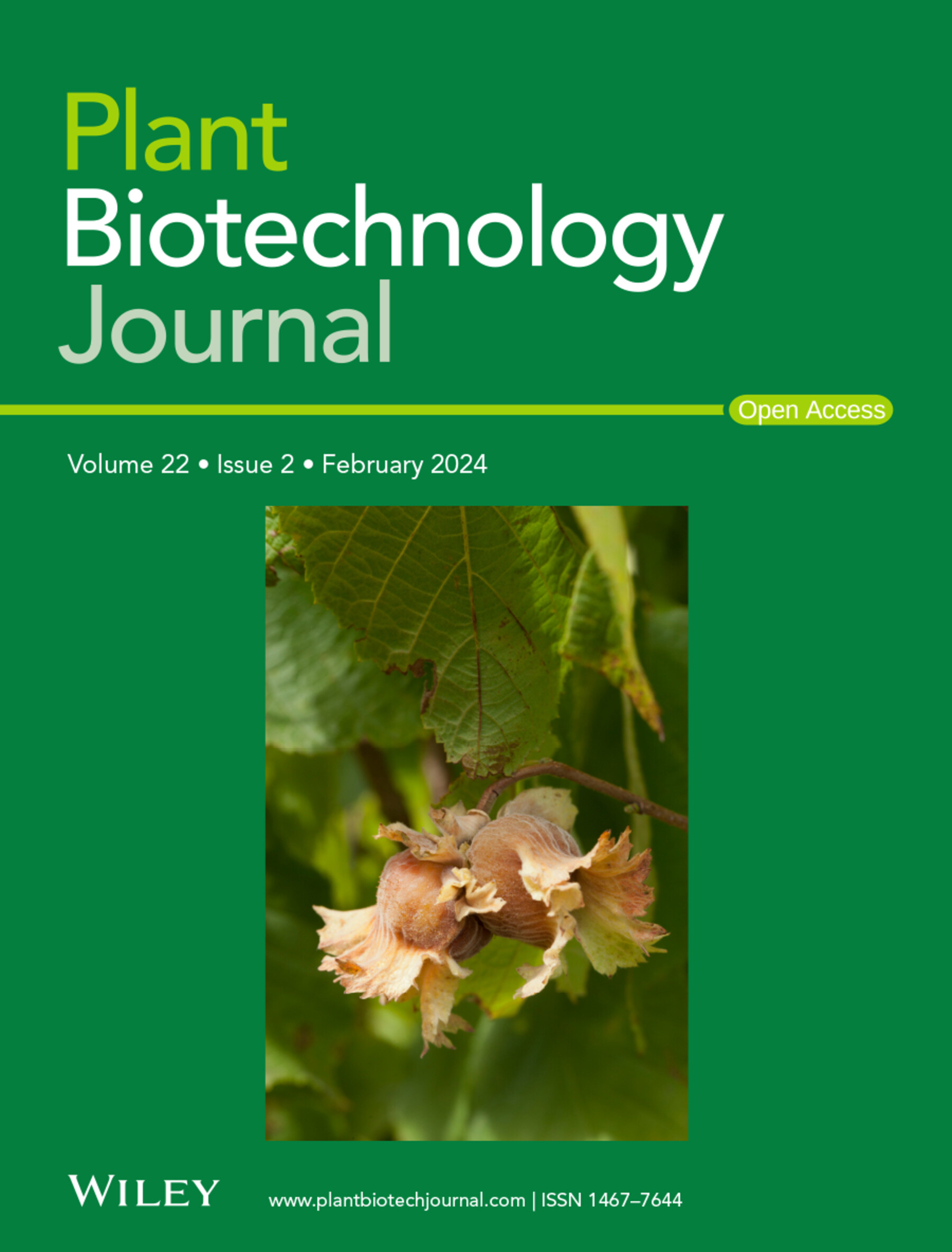MsbZIP55通过调节紫花苜蓿褪黑素的生物合成来调节耐盐性
IF 10.1
1区 生物学
Q1 BIOTECHNOLOGY & APPLIED MICROBIOLOGY
引用次数: 0
摘要
土壤盐分是一种严重危害植物生长发育的非生物胁迫。作为一种抗氧化剂和自由基清除剂,褪黑素有助于植物在非生物条件下生存,包括盐度胁迫。在这里,我们报道了盐相关基因MsSNAT1,编码限速褪黑素生物合成酶,位于叶绿体中,有助于苜蓿耐盐胁迫。我们发现过表达MsSNAT1的苜蓿品系表现出更高的内源性褪黑激素水平,并通过促进抗氧化系统和改善离子稳态来增强对盐胁迫的耐受性。此外,通过转录组测序、双荧光素酶测定和转基因分析,我们发现碱性亮氨酸拉链(bZIP)转录因子MsbZIP55与盐反应和MsSNAT1表达相关。EMSA分析和ChIP‐qPCR结果表明,MsbZIP55在体外和体内均能识别并直接结合MsSNAT1启动子。MsbZIP55作为MsSNAT1表达的负调控因子,从而减少褪黑激素的生物合成。形态学分析表明,过表达MsbZIP55的转基因紫花苜蓿通过提高Na+/K+比和降低抗氧化活性来提高盐敏感性,外源褪黑激素可以缓解这一现象。在紫花苜蓿中,RNA干扰沉默MsbZIP55可提高MsSNAT1的表达,并通过增强抗氧化系统酶活性和离子稳态来提高其耐盐性。我们的研究结果表明,MsbZIP55‐MsSNAT1模块在调节紫花苜蓿褪黑激素的生物合成中起着至关重要的作用,同时促进对盐度胁迫的保护。这些结果揭示了紫花苜蓿褪黑素生物合成与盐胁迫反应相关的调控机制。本文章由计算机程序翻译,如有差异,请以英文原文为准。
MsbZIP55 regulates salinity tolerance by modulating melatonin biosynthesis in alfalfa
SummarySoil salinity is a severe abiotic stress that damages plant growth and development. As an antioxidant and free radical scavenger, melatonin is well known for helping plants survive abiotic conditions, including salinity stress. Here, we report that the salt‐related gene MsSNAT1 , encoding a rate‐limiting melatonin biosynthesis enzyme, is located in the chloroplast and contributes to salinity stress tolerance in alfalfa. We found that the MsSNAT1 overexpressing alfalfa lines exhibited higher endogenous melatonin levels and increased tolerance to salt stress by promoting antioxidant systems and improving ion homeostasis. Furthermore, through a combination of transcriptome sequencing, dual‐luciferase assays and transgenic analysis, we identified that the basic leucine zipper (bZIP) transcription factor, MsbZIP55, is associated with salt response and MsSNAT1 expression. EMSA analysis and ChIP‐qPCR uncovered that MsbZIP55 can recognize and directly bind to the MsSNAT1 promoter in vitro and in vivo . MsbZIP55 acts as a negative regulator of MsSNAT1 expression, thereby reducing melatonin biosynthesis. Morphological analysis revealed that overexpressing MsbZIP55 conferred salt sensitivity to transgenic alfalfa through a higher Na+ /K+ ratio and lower antioxidant activities, which could be alleviated by applying exogenous melatonin. Silencing of MsbZIP55 by RNA interference in alfalfa resulted in higher expression of MsSNAT1 and promoted salt tolerance by enhancing the antioxidant system enzyme activities and ion homeostasis. Our findings indicate that the MsbZIP55‐MsSNAT1 module plays a crucial role in regulating melatonin biosynthesis in alfalfa while facilitating protection against salinity stress. These results shed light on the regulatory mechanism of melatonin biosynthesis related to the salinity stress response in alfalfa.
求助全文
通过发布文献求助,成功后即可免费获取论文全文。
去求助
来源期刊

Plant Biotechnology Journal
生物-生物工程与应用微生物
CiteScore
20.50
自引率
2.90%
发文量
201
审稿时长
1 months
期刊介绍:
Plant Biotechnology Journal aspires to publish original research and insightful reviews of high impact, authored by prominent researchers in applied plant science. The journal places a special emphasis on molecular plant sciences and their practical applications through plant biotechnology. Our goal is to establish a platform for showcasing significant advances in the field, encompassing curiosity-driven studies with potential applications, strategic research in plant biotechnology, scientific analysis of crucial issues for the beneficial utilization of plant sciences, and assessments of the performance of plant biotechnology products in practical applications.
 求助内容:
求助内容: 应助结果提醒方式:
应助结果提醒方式:


